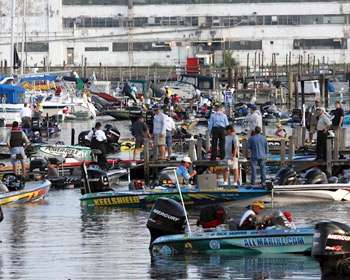
At one time or another, everyone who has ever gone out in pursuit of bass has done so with another angler's advice on how to catch them still ringing in his ears. In most cases, the information was delivered with the best of intentions. More times than not, however, such "dock talk" is more harmful than helpful.
According to veteran pro and Elite Series angler, Mark Davis, dock talk is just that … talk. "Dock talk is something that you just don't want to pay a lot of attention to," he opines. "You have to realize that, especially during a tournament, the guy that's telling stuff for everyone to hear is either telling a partial truth or is just out-and-out lying." Davis adds that even though the information given wasn't necessarily meant to deceive, when something is omitted, the result is just the same.
"I can make up a great story about how I'm catching them, and it might have a lot of truth to it," he says. "But by leaving out one key element, it won't help you a bit," he says. "That's what I think most people in a tournament do when they're talking to a group of guys about how their practice day went." You can't blame them for not wanting to reveal secrets that might hurt themselves by helping others. But you can stay away from bait shop chatter, Davis suggests.
"If I had to give one piece of advice to everyone about bass fishing, it would be to stick with what you know, or with what you're comfortable doing," he stresses. "If you've taken advice from some guy at the bait shop before you put your boat in the water, it might take you completely off the game plan you've established, or lead you toward doing something that you have absolutely no confidence in."
Even when the tips are recent and from multiple sources, Davis contends that the best information is obtained directly from the body of water you're intending to fish. "The best pattern, or the best way to catch the most fish on a lake on any given day, is seldom the way the tournament is won," he explains. "There may be a real good way to catch a bunch of fish that everyone is doing, but the guy who wins usually will be doing something else.
It might be close to what everyone else is doing, but he's found a little wrinkle or something a little different that gets the better bites." As Davis points out, there is no substitute for the knowledge an angler acquires from spending time on the water — and it's something that he prides himself on doing for each tournament in which he competes.
"I would rather start from scratch to learn what's going on rather than to take someone else's word for it," he says. Davis admits one exception to that rule. He does enough research to determine the productivity of the fishery. "If you can look at tournament results from that particular body of water, it will give you an idea of what sort of weight you need to be targeting.
That sort of Internet research can be really helpful because you'll know where you need to be at in the grand scheme of things." Another bit of information the Arkansas pro trusts is that related to the water conditions of the lake he's fishing. "On a big body of water, like Kentucky Lake, it might help to know which sections of the lake are most productive at that time," he says, "but again, finding out which part of the lake is hot is far different from information on what you need to be using when you get there."
Davis admits that it is human nature to want to hear how another angler was successful.
However, after nearly a quarter-century of chasing bass for a living, he's confident in saying, "Always stick to your strengths, and by all means, don't follow what the guy at the dock told you he did yesterday."
(Provided by Z3 Media)




